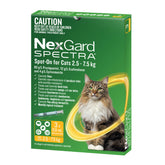How to choose the right cat food for your cat?
How to choose the right cat food?
Cats are beloved pets around the world, and taking care of them is a responsibility that should not be taken lightly. One of the most important aspects of cat care is feeding them the right food. Choosing the right cat food can be a daunting task, especially with the wide range of options available in the market. In this blog, we will discuss some important factors to consider when selecting the right cat food for your feline friend.
1. Age: Cats have different nutritional needs at different stages of their lives. Kittens require food that is rich in protein and fat to support their growth and development, whereas adult cats need a well-balanced diet that helps maintain their weight and overall health. Senior cats require food that is easy to digest and contains fewer calories to avoid obesity and health issues.
2. Nutritional requirements: Cats are obligate carnivores, which means they require a diet that is high in animal-based protein. A good quality cat food should contain at least 30-40% protein, with high-quality sources such as chicken, fish, or turkey. Additionally, cats need a balance of essential fatty acids, vitamins, and minerals to maintain optimal health.
3. Type of food: There are three main types of cat food: dry, wet, and raw. Dry food is convenient and easy to store, but it is often high in carbohydrates and lacks moisture, which can lead to urinary tract issues. Wet food is more palatable and provides essential moisture to cats, but it can be expensive and spoil quickly. Raw food is becoming more popular, as it closely mimics a cat's natural diet, but it requires careful handling and preparation to ensure it is safe to eat.
4. Brand and ingredients: It is important to choose a reputable brand that uses high-quality ingredients and avoids fillers, by-products, and artificial additives. Always check the label to ensure the first ingredient is a good quality animal protein source, such as chicken, fish, or beef. Avoid foods that contain excessive amounts of carbohydrates, as cats do not have a high requirement for this nutrient.
5. Special dietary needs: If your cat has special dietary needs, such as allergies or health conditions like diabetes or kidney disease, consult with your veterinarian to choose a suitable diet.
In conclusion, choosing the right cat food is crucial to ensure your feline friend stays healthy and happy. Consider your cat's age, nutritional requirements, type of food, brand and ingredients, and special dietary needs when making your decision. With the right food, your cat will thrive and be a cherished companion for years to come.



